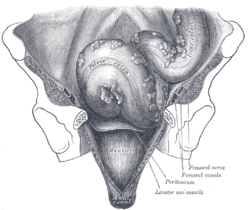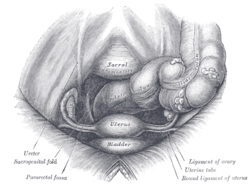Epiploic appendix
Appearance
| Epiploic appendix | |
|---|---|
 Iliac colon, sigmoid or pelvic colon, and rectum seen from the front, after removal of pubic bones and bladder. (Lumps of fat visible at right.) | |
 Female pelvis and its contents, seen from above and in front. (Lumps of fat visible at right.) | |
| Details | |
| Identifiers | |
| Latin | appendices epiploicae |
| TA98 | A05.7.03.010 |
| TA2 | 2990 |
| FMA | 76481 |
| Anatomical terminology | |
The epiploic appendices (or appendices epiploicae, or epiploic appendages, or appendix epiploica, or omental appendices) are small pouches of the peritoneum filled with fat and situated along the colon, but are absent in the rectum.
They are chiefly appended to the transverse and sigmoid parts of the colon, however, their function is unknown.
The appendages can become inflamed, a benign but painful process known as epiploic appendagitis which can mimic acute appendicitis and other conditions.
External links
- Anatomy photo:39:13-0202 at the SUNY Downstate Medical Center - "Intestines and Pancreas: Large Intestine"
- Anatomy image:7978 at the SUNY Downstate Medical Center
- largeintestine at The Anatomy Lesson by Wesley Norman (Georgetown University)
"Michael Sand et al. : Epiploic appendagitis – clinical characteristics of an uncommon surgical diagnosis BMC Surgery 2007, 7:11 (1 July 2007)".
